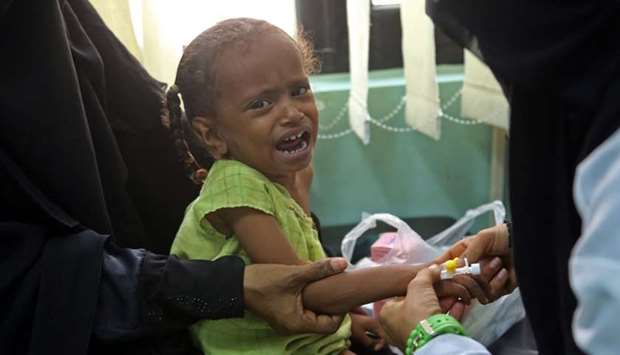"The blockade of ports, airports, of land routes has had a tremendously negative impact on a situation that is already catastrophic," said UN spokesman Stephane Dujarric.
"All parties to the conflict must allow and facilitate safe, rapid, unhindered humanitarian access to all people in need, through all ports and airports," he said.
Relief supplies have been blocked since the coalition sealed off Yemen's borders on Monday in response to a missile attack by Yemen's Houthi rebels that was intercepted near the Riyadh airport.
Two UN humanitarian flights into Yemen have been on hold since Monday.
The United Nations has listed Yemen as the world's number one humanitarian crisis, with 17 million Yemenis in need of food, seven million of whom are at risk of famine and cholera causing more than 2,000 deaths.
The Security Council is set to discuss the humanitarian crisis in Yemen on Wednesday following a request from Sweden, which said it was concerned that the situation was worsening.
"We cannot allow the world to lose attention and we must do all we can to help alleviate the suffering," said Swedish Deputy Ambassador Carl Skau.
UN aid chief Mark Lowcock is to brief the council on his recent visit to Yemen.
The United Nations has had contacts with Saudi officials in New York and in Riyadh, UN officials said.
Prices going up
"If these channels, these lifelines, are not kept open it is catastrophic for people who are already in ... the world's worst humanitarian crisis," said Jens Laerke.
"Fuel, food and medicine imports must continue to enter the country," Laerke said. "This is an access problem of colossal dimensions."
The coalition has asked the United Nations to clear ships from the port of Hodeidah, an important hub for the delivery of aid, according to UN officials.
As a result of the border closures, fuel prices have jumped by up to 60 percent and cooking gas prices have doubled, Laerke said.
"Any further shocks to imports of food and fuel may reverse recent successes in mitigating the threat of famine," warned Dujarric.
The Saudi-led Arab military coalition intervened in Yemen in March 2015 to support President Abedrabbo Mansour Hadi after the Houthis forced him into exile.
Last month, the United Nations put the coalition on its blacklist for killing and maiming 683 children during the conflict last year and for carrying out 38 verified attacks on schools and hospitals.
The UN's rights office said 5,295 civilians had been killed in Yemen since the coalition offensive began, and 8,873 have been injured.



